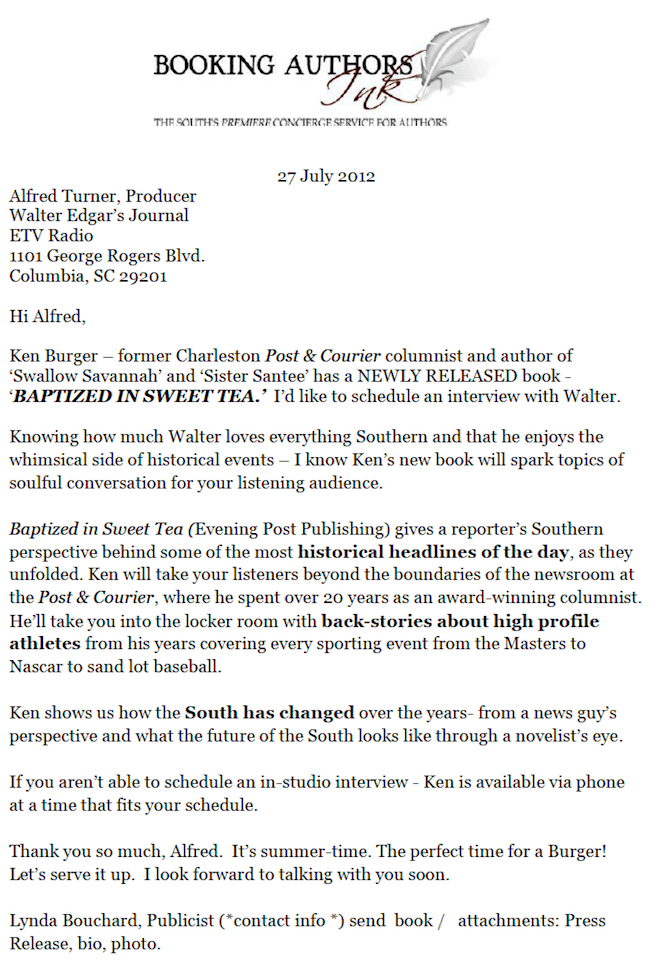
Our thanks to literary publicist Lynda Bouchard for this guest contribution, just in time to meet those New Year’s pitch resolutions!
Pitching journalists is one of the things I love the most about the work I do for authors. It is the most challenging writing I engage in because it must distill an author’s book, idea, speech or product into very few words. It must be creative while showing ways it can help inform, entertain and transform others.
They key word being – others.
A great pitch is a delicate balance of highlighting your author’s salient points while making it relevant and interesting to a target audience. The mindset of helping others is critical. EX: ‘this will help your audience understand….,’ or ‘this information will resonate with you because…’
Sure, you’ve written a book – but it isn’t about you when it comes to the media taking notice.
It’s no secret that reporters get tons of unsolicited pitches every day.
If you’ve ever wondered why a journalist doesn’t respond to yours, or why you can’t seem to land coverage for your clients at a certain publication, you can blame the dozens of other writers and PR types pitching that same journalist in any given week.
The ratio of publicist to journalist is at least 5 to 1. I’m not exaggerating. The odds are staggering. But you can improve your odds of standing out by improving your pitch and your intentions before delivering it.
These are always my intentions and they dovetail with why I love pitching so much and why you should, too:
- Pitching helps you think differently.
- It brings opportunity to dig into the many layers of a book’s subject matter.
- It helps align on-going publicity with short-term events (and visa-versa)
- It creates conversation between you and your author.
- It helps an author dig for back-story about themselves and their work.
- It creates meaningful connections with the media (whatever the result)
- It teaches you that crazy ideas get noticed.
- It brings value to others.
- Great ideas and pitches take on a life of their own with surprising results.
- The ‘pitcher’s high’ which results from ‘Yes’ is priceless for the author and the audience.
*I am including one of my pitches along with the link that got regional NPR results: http://legacy.scetv.org/podcastmedia/audio/walter_edgars_journal/02_22_13.mp3

Tips for improving your pitch:
- Make it personalized. Get the editor/journalist’s name and publication right (you’d be surprised how often that doesn’t happen). Tip: Reference past articles they’ve written to show you’ve done your research to match your client’s story to their coverage.) Personalize your pitch as well. Be conversational, funny, insightful. Editors are people. Approach as if you were talking to a person.
- Filled a void in coverage. Do your research. Take a totally new approach to a topic or present a unique story; the pitches that make headlines are different.
- Don’t be self-promotional. Self-serving pitches (i.e., “Our survey found that many have this problem, and our product solves that problem!”) don’t do a whole lot. Tell a story that’s never been told. Make it timely and targeted.
- Be flexible.It’s rare that journalists can use a story exactly as it’s pitched to them. The publicists and ideas that get attention are open to tweaks to the original angle, to make the final piece better aligned with editorial and audience needs. Most importantly, be accommodating about meeting deadlines. Journalists are overwhelmed. Make it easy for them. I am frequently asked to write the article after I’ve pitched it! It’s a win-win. *here’s the piece I was asked to write on David Baldacci : http://www.lcweekly.com/books/2992-the-craft-of-character-and-conspiracy
4.5 Send a hand-written Thank You note. This stands out as the #1 reason journalists will remember you. In a technological world, your handwritten note will always stand out. I send one to the media whether or not my pitch is accepted. It creates good will. It says you value their time and that you understand the importance of their job to your success.
Enjoy a great year of pitching. Hope yours get over the plate every time!
What are some of your pitching success stories? Please share with your comments below!
 Lynda Bouchard is founder of Booking Authors Ink, a boutique marketing firm dedicated to Southern authors. She is known for her nimble ‘outside the book’ thinking and creative pitches which have garnered her clients major media mentions. Follower her on Twitter: @AuthorsInk and on LinkedIn: https://www.linkedin.com/in/bookingauthorsink
Lynda Bouchard is founder of Booking Authors Ink, a boutique marketing firm dedicated to Southern authors. She is known for her nimble ‘outside the book’ thinking and creative pitches which have garnered her clients major media mentions. Follower her on Twitter: @AuthorsInk and on LinkedIn: https://www.linkedin.com/in/bookingauthorsink
